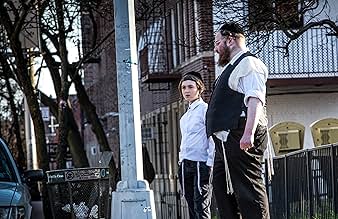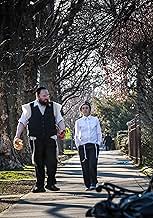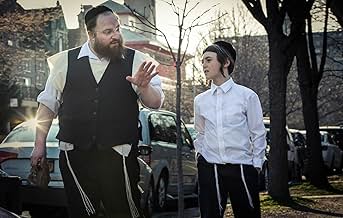IMDb RATING
6.6/10
2.7K
YOUR RATING
Within Brooklyn's ultra-orthodox Jewish community, a widower battles for custody of his son. A tender drama performed entirely in Yiddish, the film intimately explores the nature of faith an... Read allWithin Brooklyn's ultra-orthodox Jewish community, a widower battles for custody of his son. A tender drama performed entirely in Yiddish, the film intimately explores the nature of faith and the price of parenthood.Within Brooklyn's ultra-orthodox Jewish community, a widower battles for custody of his son. A tender drama performed entirely in Yiddish, the film intimately explores the nature of faith and the price of parenthood.
- Awards
- 7 wins & 18 nominations total
Meir Ber Schwartz
- The Ruv
- (as Meyer Schwartz)
Melissa Weisz
- Bayla
- (voice)
Featured reviews
The price tag on fatherhood soars when tradition knocks on your door. Orthodoxy antagonizes the downtrodden, and fortune is monopolized by the most religious adherents. Yiddish mumbles separate father from son. Songs of lament ring through thin apartment walls. The rambunctious laughter of Menashe's child is limited to sidewalk engagements.
Employee of the month every month, Menashe is invaluable to his dictatorial boss at the borough's cultural specific grocery front. This distinction is not established by Menashe's work ethic, but rather by his attention to detail. With Hispanic co-workers, his Hasidic sensibilities garner favor with his Jewish supervisor. Menashe truly desires the best for the customers, and even if the man in charge cannot accommodate, the sentiment is appreciated with stern denials.
Approaching a year since the most bitter sweet loss of his self- contained life, Menashe is finally heeding his Rabbi's instructions, albeit halfheartedly. He submits to uncomfortable appointments in hopes of restoring a household. He is attempting to regain one person, by courting another.
His book speaks of man's inadequacy void of a woman. The Torah crafts a tale of interdependence, and his leadership point at passages to bolster his grief. The community cares for his son above him, and he cares for his son above all else. The walls of domesticity have tumbled, and he is the remaining survivor in Jericho.
A man cannot be expected to run a home and a livelihood, Menashe is reminded by his financially obese brother-in-law. The division in duties is divinely appointed, and Menashe's spiritual juggling can be blamed for his misfortune. His orthodoxy begins to slip. His coat and hat creep out of his closet, and he studies haphazardly.
What Menashe lacks in observance, he corrects with compassion. He is zealous but in an unconventional manner. He mimics his creator when he horses around with his only child. The abandon and whimsy of Menashe infects the boy, and together they create a fuller home than any other formal nuclear family. The uncompromising devotion to one's offspring might just rewrite thousands of years of tradition.
Employee of the month every month, Menashe is invaluable to his dictatorial boss at the borough's cultural specific grocery front. This distinction is not established by Menashe's work ethic, but rather by his attention to detail. With Hispanic co-workers, his Hasidic sensibilities garner favor with his Jewish supervisor. Menashe truly desires the best for the customers, and even if the man in charge cannot accommodate, the sentiment is appreciated with stern denials.
Approaching a year since the most bitter sweet loss of his self- contained life, Menashe is finally heeding his Rabbi's instructions, albeit halfheartedly. He submits to uncomfortable appointments in hopes of restoring a household. He is attempting to regain one person, by courting another.
His book speaks of man's inadequacy void of a woman. The Torah crafts a tale of interdependence, and his leadership point at passages to bolster his grief. The community cares for his son above him, and he cares for his son above all else. The walls of domesticity have tumbled, and he is the remaining survivor in Jericho.
A man cannot be expected to run a home and a livelihood, Menashe is reminded by his financially obese brother-in-law. The division in duties is divinely appointed, and Menashe's spiritual juggling can be blamed for his misfortune. His orthodoxy begins to slip. His coat and hat creep out of his closet, and he studies haphazardly.
What Menashe lacks in observance, he corrects with compassion. He is zealous but in an unconventional manner. He mimics his creator when he horses around with his only child. The abandon and whimsy of Menashe infects the boy, and together they create a fuller home than any other formal nuclear family. The uncompromising devotion to one's offspring might just rewrite thousands of years of tradition.
This quiet drama portrays the scuffling life of a man within the Hasidic community in Brooklyn as he endeavors to regain custody of his son in the aftermath of his wife's passing. He is expected to find a new wife and achieve stability as he holds down a low-paying, labor-intensive job as a grocery clerk that drains him of his time and his spirit. He has difficulty keeping his own modest life in order, let alone being strong enough to provide for another human being.
His efforts to better himself in order to regain custody of his son are met with dismissal from those around him, including his more devout and financially stable brother-in-law whom the community has decided should look after the man's son. He gets little encouragement from those within his community, yet he persists.
There is a considerable schism within the Hasidic community that comes to light in this film, especially on account of the man's less-than-pious lifestyle and more secular demeanor. He doesn't readily embrace the hard-line teachings of his sect as forcefully as his peers, but he nevertheless wants what's best for his son and wants to fulfill the requirements of his denomination in order to remain a real father. In that regard, this is an exceptional portrayal of loyalty to one's religious faith in the face of ongoing personal conflict. It's definitely not for many viewers who wouldn't relate to religious doctrine as a deciding force in one's life, but it's still a story that's effectively conveyed and devoid of proselytizing. Recommended to open-minded viewers.
His efforts to better himself in order to regain custody of his son are met with dismissal from those around him, including his more devout and financially stable brother-in-law whom the community has decided should look after the man's son. He gets little encouragement from those within his community, yet he persists.
There is a considerable schism within the Hasidic community that comes to light in this film, especially on account of the man's less-than-pious lifestyle and more secular demeanor. He doesn't readily embrace the hard-line teachings of his sect as forcefully as his peers, but he nevertheless wants what's best for his son and wants to fulfill the requirements of his denomination in order to remain a real father. In that regard, this is an exceptional portrayal of loyalty to one's religious faith in the face of ongoing personal conflict. It's definitely not for many viewers who wouldn't relate to religious doctrine as a deciding force in one's life, but it's still a story that's effectively conveyed and devoid of proselytizing. Recommended to open-minded viewers.
"Menashe" is a semi-documentary, reflecting the case of Menashe Lustig, the actor performed the main character. A film about laws of an ultra conservative community, about parenthood and about life. And , sure, about vulnerable people. Touching and delicate and precise, the work of Menashe Lustig is just admirable. He is the film and I admitt, I saw me reflected in his beautiful portrait of the single father , lost across the challenges, naive and man of good intentions, prisoner of his life. So, a gem . A real special one because it is not a lesson but a confession, honest at whole.
Really like the film.
I'm hoping that I got a pretty actuate perceptive on the Hasidic Jewish community. I'm aware of some aspects about how women are treated as a whole, which for me, made it more interesting that the movie tells a story about a widowed father trying to raise his son in a society that says he can't do it.You don't see that enough in movies in general. A man doing what he has to to be a man in order to raise his child alone, and I'm seeing it in the most rarest prospective.
It reminds me of Moonlight, it's not really a story I've never herd before but nobody tells the story from this unique angel.
Brilliant! http://cinemagardens.com
I'm hoping that I got a pretty actuate perceptive on the Hasidic Jewish community. I'm aware of some aspects about how women are treated as a whole, which for me, made it more interesting that the movie tells a story about a widowed father trying to raise his son in a society that says he can't do it.You don't see that enough in movies in general. A man doing what he has to to be a man in order to raise his child alone, and I'm seeing it in the most rarest prospective.
It reminds me of Moonlight, it's not really a story I've never herd before but nobody tells the story from this unique angel.
Brilliant! http://cinemagardens.com
This movie causes tremendous anguish, okay Menashe can't be considered what we usually call a responsible adult, but the rules on fatherhood revolted me extremely, it hurt, to see the love for the child and the mandatory absence (no father and mother a child can't study) absurd... Slow, delicate, simple, a pure portrait of father/son love and Jewish traditions. Menashe's plot is loosely based on Lustig's life. In an interview with the Los Angeles Times, he said that "unlike Menashe in the movie, I'm not a schlimazel by nature. Maybe just a schlimazel by situation."
Did you know
- TriviaDirector Joshua Z Weinstein, who is neither a member of a Haredi community nor a speaker of Yiddish, used a translator on set.
- SoundtracksIvdu Es Hashem Mit Simcha
Written and performed by Michoel Schnitzler
Courtesy of Michoel Schnitzler
- How long is Menashe?Powered by Alexa
Details
- Release date
- Countries of origin
- Official site
- Languages
- Also known as
- Menashe
- Filming locations
- Production companies
- See more company credits at IMDbPro
Box office
- Gross US & Canada
- $1,703,036
- Opening weekend US & Canada
- $62,078
- Jul 30, 2017
- Gross worldwide
- $1,962,265
- Runtime
- 1h 22m(82 min)
- Color
- Sound mix
- Aspect ratio
- 2.00 : 1
Contribute to this page
Suggest an edit or add missing content
























